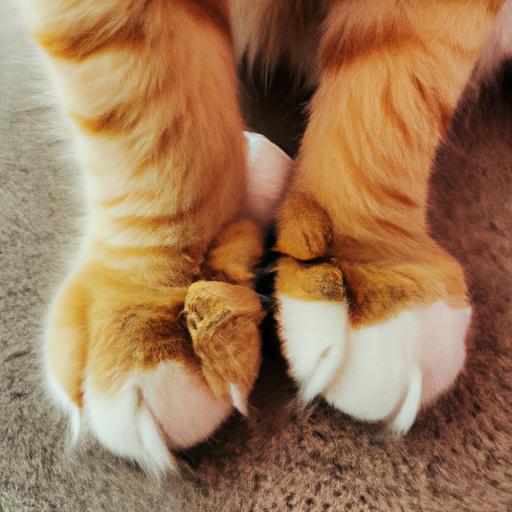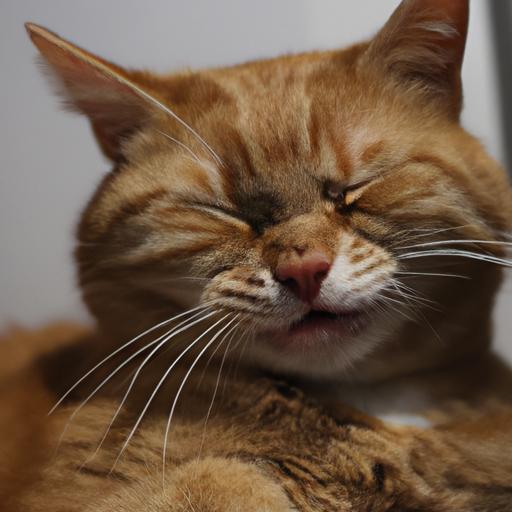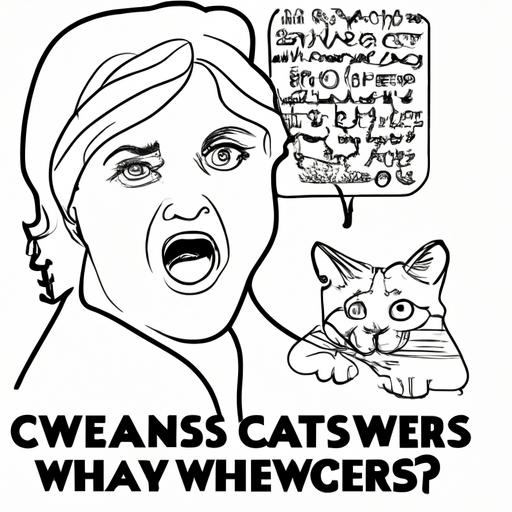Cat Wheezing After Liquid Medicine: Understanding the Issue and Taking Action
Have you ever noticed your furry feline wheezing after administering liquid medicine? It can be a cause for concern, leaving us wondering about the possible reasons behind this unsettling reaction. In this article, we will delve into the world of cat wheezing after liquid medicine, exploring the causes, symptoms, and steps to address this issue effectively. Let’s ensure the well-being of our beloved cats by understanding and addressing this matter promptly.
When we talk about cat wheezing, we refer to the occurrence of a high-pitched, whistling sound while breathing. Similar to humans, cats can experience respiratory issues that lead to wheezing. However, the administration of liquid medicine can sometimes trigger this uncomfortable response in our feline friends. It is crucial to recognize and address this issue to ensure the health and comfort of our cats.
Now, you might be wondering why it is important to address this problem. Well, wheezing can be a sign of an underlying health concern in cats. It could indicate an allergic reaction to the medication, inhalation of the liquid medicine, or even irritation caused by the taste or texture of the medication. Ignoring this issue could potentially worsen your cat’s condition and impact their overall well-being.
In the upcoming sections of this article, we will explore the symptoms and diagnosis of wheezing in cats, unravel the possible reasons behind cat wheezing after liquid medicine, and discuss treatment options and preventive measures. By understanding this issue comprehensively, we can take proactive steps to ensure our cats receive the care they need and deserve.
Stay tuned for the next section, where we will delve deeper into the symptoms and diagnosis of cat wheezing, helping you identify and differentiate it from other respiratory problems. Together, let’s ensure our furry companions breathe easy and live a healthy, happy life.
Understanding Cat Wheezing
Definition of Wheezing in Cats
To effectively address cat wheezing after liquid medicine, it’s crucial to understand what wheezing entails. Wheezing is a high-pitched, whistling sound produced during the breathing process. In cats, it typically occurs when there is a narrowing or obstruction in the airways, leading to difficulty in breathing. This sound is a result of the air being forced through constricted passages, causing vibrations.
Common Causes of Wheezing in Cats
Wheezing in cats can be caused by various factors. Some common culprits include:
1. Allergies
Cats, like humans, can develop allergies to certain substances. These allergens can trigger an allergic response, causing inflammation and narrowing of the airways, resulting in wheezing.
2. Respiratory Infections
Respiratory infections, such as feline viral respiratory diseases, can lead to wheezing in cats. These infections affect the upper respiratory tract, causing inflammation and mucus buildup, which can obstruct the airways and result in wheezing.
3. Asthma
Asthma is a chronic respiratory condition that can affect cats. When exposed to triggers like dust, pollen, or certain chemicals, cats with asthma experience inflammation and constriction of the airways, leading to wheezing.
4. Foreign Object Inhalation
Curious cats may accidentally inhale small foreign objects, such as grass blades or toy parts, leading to airway obstruction and wheezing.
Impact of Liquid Medicine on Cat’s Respiratory System
Liquid medications, though essential for treating various feline conditions, can sometimes contribute to wheezing episodes in cats. The impact of liquid medicine on a cat’s respiratory system can vary depending on several factors:
1. Allergic Reactions
Some cats may exhibit an allergic reaction to specific liquid medications, leading to wheezing as a symptom. It’s crucial to monitor your cat closely after administering medication to identify any adverse reactions.
2. Inhalation of Liquid Medicine
If liquid medication is administered too quickly or in large quantities, there is a possibility of it being accidentally inhaled into the cat’s airways. This can cause irritation and inflammation, resulting in wheezing.
3. Taste and Texture Irritation
Certain medications may have an unpleasant taste or texture that can cause discomfort when ingested, leading to respiratory distress and wheezing.
Understanding the causes and impact of cat wheezing after liquid medicine is vital for effective management and treatment. In the following sections, we will explore the symptoms and diagnosis of cat wheezing, helping you identify and address this issue promptly.
Symptoms and Diagnosis
Identifying symptoms of wheezing in cats
As concerned cat owners, it’s vital to familiarize ourselves with the telltale signs of wheezing in our feline friends. While wheezing itself is a noticeable symptom, there are other indicators that can help us identify this respiratory issue. Keep a keen eye out for the following signs:
-
Audible wheezing sounds: Wheezing is characterized by a high-pitched, whistling noise during your cat’s breathing. If you notice this unusual sound, it’s essential to pay attention and investigate further.
-
Labored breathing: Observe if your cat is experiencing difficulty breathing, including rapid or shallow breaths, extended periods of panting, or increased effort while taking in air.
-
Coughing and sneezing: Cats with wheezing issues may also exhibit persistent coughing or sneezing. These actions could be their body’s attempt to clear their airways.
-
Lack of appetite and lethargy: Cats may show a decrease in appetite and energy levels when experiencing wheezing. If you notice a sudden decline in their usual behavior or enthusiasm, it could be linked to respiratory distress.
Differentiating wheezing from other respiratory problems
While wheezing is a common respiratory symptom, it’s crucial to differentiate it from other potential respiratory problems your cat may face. By understanding the distinctions, you can provide accurate information to your veterinarian and aid in the diagnosis process. Here are a few respiratory issues to consider:
-
Coughing: Unlike wheezing, coughing is the forceful expulsion of air from the lungs, often accompanied by a distinctive sound. If your cat’s respiratory sounds are more cough-like rather than wheezing, it could indicate a different problem.
-
Congestion and nasal discharge: If your cat experiences nasal congestion or has a runny nose with discharge, it may be a sign of an upper respiratory infection rather than wheezing.
-
Panting: Panting is not generally associated with wheezing but can occur due to stress, overheating, or exertion. It’s essential to consider the context when evaluating your cat’s breathing patterns.
Seeking veterinary help for accurate diagnosis
When it comes to your cat’s health, it’s always best to consult a veterinarian for a proper diagnosis. If you notice any of the symptoms mentioned or suspect your cat is wheezing after liquid medicine, schedule an appointment promptly. A veterinarian’s expertise will aid in determining the underlying cause and provide appropriate treatment options tailored to your cat’s specific needs.
In the next section, we will explore the possible reasons behind cat wheezing after liquid medicine, shedding light on potential triggers for this concerning reaction. Stay engaged and let’s unravel the mystery together!
Possible Reasons for Cat Wheezing After Liquid Medicine
When it comes to cat wheezing after liquid medicine, there are several potential reasons that could explain this peculiar reaction. Understanding these possible causes can help us address the issue more effectively and provide the necessary care for our furry companions.
A. Allergic reactions to medication
Just like humans, cats can also experience allergies to certain substances, including medications. Some cats may exhibit an allergic reaction to specific components present in the liquid medicine, leading to wheezing as a response. It is essential to pay attention to any other accompanying symptoms, such as itching, swelling, or difficulty breathing, which may indicate an allergic reaction.
B. Inhalation of liquid medicine
Liquid medications are typically administered orally to cats using a syringe or dropper. In some instances, the cat may accidentally inhale a small amount of the liquid medicine while swallowing. This inhalation can cause irritation in the respiratory tract, resulting in wheezing. Ensuring proper administration techniques and taking precautionary measures can help minimize the risk of inhalation.
C. Irritation caused by the taste or texture of the medication
Cats are known for their discerning taste buds, and they can be quite picky when it comes to flavors and textures. Some liquid medications may have a strong taste or an unfamiliar texture that can trigger irritation in the cat’s throat and airways, leading to wheezing. Understanding your cat’s preferences and discussing alternatives with your veterinarian can help mitigate this issue.
By considering these possible reasons for cat wheezing after liquid medicine, we can narrow down the cause and take appropriate action. In the next section, we will explore treatment options and preventive measures to alleviate wheezing in our feline friends. Remember, taking proactive steps is key to ensuring our cats receive the care they need and deserve.
Treatment and Prevention
Veterinary Interventions for Wheezing Cats
When you notice your cat wheezing after liquid medicine, it is crucial to seek veterinary help for a proper diagnosis and treatment plan. Veterinary interventions play a vital role in addressing the underlying causes of wheezing and ensuring your cat receives the necessary care. Your veterinarian may recommend various approaches, depending on the specific situation and severity of the wheezing.
One common treatment option is the administration of bronchodilators or anti-inflammatory medications to alleviate the wheezing symptoms. These medications help open up the airways, allowing your cat to breathe more comfortably. Additionally, your veterinarian may prescribe antibiotics if an infection is present or suggest other specialized treatments based on the underlying cause of the wheezing.
Medication Alternatives for Cats with Wheezing Issues
In some cases, cats may exhibit adverse reactions to certain liquid medications, leading to wheezing. If your feline friend experiences consistent wheezing after a specific medication, it is essential to discuss alternative options with your veterinarian. They may suggest different forms of medication, such as pills or injections, that can be better tolerated by your cat’s respiratory system.
Furthermore, if allergies are suspected as the cause of wheezing, your veterinarian may recommend allergy testing to identify the specific triggers. This information allows for targeted treatment plans, including the use of hypoallergenic medications or lifestyle adjustments to minimize exposure to allergens.
Preventive Measures to Avoid Cat Wheezing After Liquid Medicine
Prevention is always better than cure, and there are steps you can take to minimize the likelihood of your cat wheezing after liquid medicine administration. Here are some preventive measures to consider:
-
Proper Administration Technique: Ensure you are following the correct technique when administering liquid medicine to your cat. This includes using the appropriate dosage, avoiding sudden forceful administration, and allowing your cat to swallow the medication properly.
-
Taste and Texture Considerations: Discuss with your veterinarian if there are alternative medications with different taste or texture options that might be better tolerated by your cat. Sometimes, a change in formulation can make a significant difference in preventing wheezing episodes.
-
Allergy Awareness: If your cat has known allergies, inform your veterinarian to avoid prescribing medications that may trigger an allergic reaction. By being proactive and mindful of your cat’s allergies, you can help prevent wheezing and discomfort.
By working closely with your veterinarian and implementing these preventive measures, you can significantly reduce the chances of wheezing after liquid medicine administration and ensure the well-being of your feline companion.
Stay tuned for the concluding section of this article, where we will recap the key points discussed and highlight the importance of addressing cat wheezing promptly. Together, let’s provide the best care for our wheezing cats!
Conclusion
In conclusion, addressing the issue of cat wheezing after liquid medicine is of utmost importance to ensure the well-being and comfort of our beloved furry friends. By understanding the causes, symptoms, and potential solutions, we can take proactive steps to alleviate their discomfort and prevent further complications.
Throughout this article, we explored the various aspects of cat wheezing after liquid medicine. We learned that wheezing can be a sign of an underlying health concern, such as an allergic reaction or irritation caused by the medication. It is crucial to seek veterinary help for accurate diagnosis and appropriate treatment.
Moreover, we discussed preventive measures to avoid cat wheezing after liquid medicine, emphasizing the importance of administering medication properly and exploring alternative medication options when necessary. By taking these measures, we can minimize the risk of adverse reactions and ensure our cats receive the necessary treatment without unnecessary discomfort.
Remember, if you notice your cat wheezing after administering liquid medicine, it is always best to consult with a veterinarian. They possess the expertise and knowledge to provide appropriate guidance and treatment options tailored to your cat’s specific needs.
In conclusion, let’s prioritize the health and well-being of our feline companions. By staying vigilant, seeking professional advice when needed, and implementing preventive measures, we can help our cats lead a healthy, wheeze-free life. Together, we can ensure their comfort and happiness, making our bond with them even stronger.





